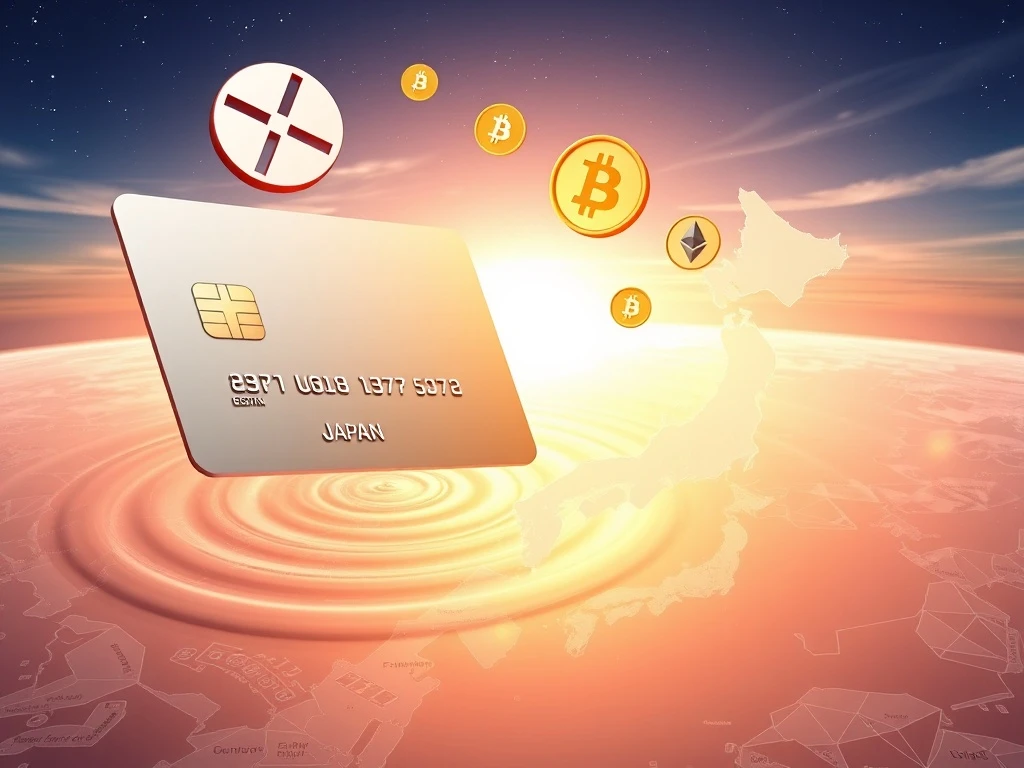Earn XRP: Japan Unlocks Pioneering Crypto Rewards with Aplus Credit Card

Are you ready to revolutionize how you acquire digital assets? Imagine earning cryptocurrencies like XRP, Bitcoin, and Ether simply by using your everyday credit card. This groundbreaking development is no longer a distant dream. Japan is now leading the charge, offering an innovative way to earn XRP and other digital assets without direct cash investment. This shift marks a significant step towards mainstream crypto integration.
Earn XRP Without Spending Yen: A New Era of Crypto Rewards in Japan
On July 8, 2025, Japan witnessed a pioneering financial innovation. Aplus, a prominent credit card and financial services company under Japan’s Shinsei Bank Group, joined forces with SBI VC Trade. SBI VC Trade is the cryptocurrency exchange division of SBI Holdings. Together, they introduced a revolutionary rewards program. For the first time, cryptocurrencies have been incorporated as redeemable assets within the Aplus Points program. This initiative allows Aplus credit cardholders to convert their reward points directly into digital currencies. These include XRP (XRP), Bitcoin (BTC), and Ether (ETH). Aplus thus became the first major Japanese loyalty program to enable such direct conversion.
Before this landmark collaboration, Aplus points offered consumers traditional redemption options. These included cash, merchandise, or airline miles. This new feature seamlessly connects everyday spending with the burgeoning world of digital assets. Cardholders can now redeem 2,100 Aplus points for over 2,000 Japanese yen worth of cryptocurrency. This innovative program highlights SBI’s deep commitment to promoting widespread Japan crypto adoption. Its strong support for XRP, in particular, stands out. The program simplifies access to digital assets. It provides an easy, cash-free method for users to acquire cryptocurrencies.
The Aplus Credit Card: Your Gateway to Digital Assets
The Aplus Points system rewards customers based on their monthly credit card spending. For every 200 yen spent with an Aplus credit card, users earn 1 Aplus point. This straightforward system makes earning points accessible to all cardholders. Furthermore, if you spend 50,000 yen or more monthly, you receive an extra 0.5% bonus on your points. This encourages higher card usage and offers greater rewards. Points remain valid for two years from the month they are earned. This generous validity period gives users ample time to plan their redemptions.
With the new cryptocurrency integration, cardholders can now convert 2,100 Aplus points into over 2,000 yen worth of cryptocurrency. As of July 15, 2025, this value is approximately $13-$15, depending on prevailing exchange rates. This conversion option applies to three highly sought-after digital assets: XRP, BTC, and ETH. The process offers a simple, cash-free way for everyday users to enter the cryptocurrency market. They do not need direct investment or complex technical knowledge. This ease of access significantly lowers the barrier to entry for new crypto enthusiasts.
Did you know? Traditional financial giants like American Express, Mastercard, and Visa have already explored or launched crypto rewards programs. They partnered with leading crypto platforms such as Coinbase, BlockFi, and Gemini. This global trend clearly demonstrates how traditional finance increasingly embraces digital perks.
Boosting Japan Crypto Adoption Through Innovative Programs
The inclusion of XRP in the Aplus point redemption system perfectly aligns with SBI Holdings’ long-standing partnership with Ripple. It also syncs with XRP’s growing utility within Japan’s expanding digital economy. XRP was, in fact, the very first cryptocurrency offered on SBI VC Trade when it commenced operations in 2018. Since then, SBI has significantly expanded its XRP-related services. These now include lending services and non-fungible token (NFT) projects built on the XRP Ledger (XRPL). This continued investment underscores SBI’s belief in XRP’s foundational role.
Japan’s clear and progressive regulatory framework for digital assets further supports this adoption. The Financial Services Agency (FSA) established these robust guidelines. They foster cryptocurrency adoption while ensuring strong investor protection. This regulatory clarity empowers entities like SBI and Aplus to integrate cryptocurrencies smoothly into consumer finance. This structured environment provides a stark contrast to the regulatory uncertainties found in many other nations. It positions Japan as a global leader in responsible crypto innovation. This systematic approach is crucial for broader Japan crypto adoption.
Why XRP? SBI Holdings Crypto Strategy Explained
XRP’s intrinsic characteristics make it particularly suitable for this rewards program. Its fast transaction speeds and remarkably low fees are key advantages. These attributes make it exceptionally well-suited for cross-border payments. XRP offers considerable cost advantages over Bitcoin and Ethereum for such transactions. This efficiency makes it an attractive asset for both businesses and consumers. SBI Holdings crypto strategy deeply integrates XRP. This is evident in their various ventures, from exchange offerings to lending and NFT projects.
SBI Holdings has consistently championed XRP’s potential. Executives at SBI have described XRP adoption as a significant opportunity for wealth creation. This strategic vision extends beyond simple trading. It aims to embed XRP into the core of mainstream financial operations. The integration with Aplus credit points is a testament to this long-term strategy. It showcases XRP’s practical value in a tangible, user-friendly context. This move solidifies SBI’s role in shaping the future of digital finance in Japan and beyond.
The Practicality of Crypto Rewards Japan: Accessibility for Everyday Users
The integration of XRP into the Aplus point system offers consumers a simple, risk-free pathway to access cryptocurrency. They do not need to use their own cash. By making everyday purchases with an Aplus credit card, users earn points. These points can then be conveniently converted into XRP, BTC, or Ether through the Aplus portal or SBI VC Trade. This direct conversion mechanism eliminates many common barriers to crypto entry. It removes the need for complex exchange sign-ups or significant upfront investments. This makes crypto rewards Japan a truly accessible concept.
Although the redemption value of 2,000 yen (for 2,100 points) may seem modest, it establishes a practical and tangible link between regular spending and owning digital assets. This approach makes cryptocurrency far more accessible to everyday users. It particularly benefits those who are cautious about direct investments in the volatile crypto market. The system is ideal for both newcomers to cryptocurrency and individuals seeking to diversify their loyalty point usage. It simplifies the process of entering the crypto market. Furthermore, it supports wider adoption of digital assets within Japan’s robust and regulated financial environment.
Did you know? Even if you do not directly buy crypto, rewards-based crypto can be taxable in many countries. This applies once you redeem or sell it. Your “free” Bitcoin could unexpectedly come with a tax bill. Understanding these implications is crucial for responsible asset management.
Strategic Implications and Global Context of Loyalty Crypto
Integrating XRP with Aplus credit points represents a strategic expansion of SBI’s comprehensive financial ecosystem. This move effectively links SBI’s traditional banking services, credit card operations, and cryptocurrency exchange (SBI VC Trade). It seamlessly connects them with consumer-focused digital asset rewards. This initiative strengthens SBI’s interconnected financial services network. It also demonstrates the company’s strong, unwavering commitment to promoting cryptocurrency adoption across Japan. By including XRP as a primary reward option, SBI showcases a clear pro-cryptocurrency stance. This sets a powerful example for other banks in Japan and across Asia. This bold move positions SBI as a clear leader in bridging traditional finance with cutting-edge blockchain technology.
The option to earn XRP and other cryptocurrencies through credit card points is part of a growing global trend. This trend aims to blend digital assets with everyday consumer finance. Partnerships like Amex-Coinbase in the US have already allowed users to convert loyalty rewards into cryptocurrencies. Japan’s Aplus-XRP integration significantly advances this idea. It distinguishes itself through clear regulations and robust institutional support. With well-established cryptocurrency laws overseen by the FSA, Japan offers a stable and secure environment for such innovations. It serves as a compelling model for other countries exploring regulated crypto adoption. Unlike speculative trading platforms, the Aplus program is a user-friendly initiative. It simplifies digital assets for consumers. It prioritizes accessibility and education, enabling everyday users to engage with cryptocurrencies without direct financial risk. By incorporating XRP and other digital assets into a familiar rewards system, the program introduces digital finance to a broader audience. This could potentially encourage wider global cryptocurrency adoption.
Key Considerations for Maximizing Your Earn XRP Opportunity
While the XRP-Aplus integration offers an innovative way to enter the cryptocurrency market, it comes with certain limitations and important considerations. Understanding these factors ensures a well-informed and smooth experience.
- Redemption Amount: You receive 2,000 yen worth of cryptocurrency for 2,100 points. This amount is relatively small. It may not attract significant engagement or sustained interest, particularly from experienced investors. However, for newcomers, it serves as an excellent low-risk entry point.
- Regulatory Compliance: Even though users are not spending cash directly, they must adhere to Japan’s strict cryptocurrency regulations. This includes potential tax obligations. If the redeemed cryptocurrency appreciates in value and is later sold, users might face a tax bill. Understanding these rules is crucial.
- Asset Management: Users become responsible for managing their digital assets. This occurs through SBI VC Trade or by transferring them to personal wallets. This raises important questions about custody, security, and personal responsibility for digital asset management. Secure storage practices are essential.
- Redemption Frequency: Clarity is still needed regarding redemption frequency. It is currently unclear if redemptions can occur regularly each month or if any restrictions exist. Such limitations could impact the program’s overall appeal and utility for consistent users.
- Need for Clarity and Education: Given these factors, clear guidelines and comprehensive user education are absolutely essential. Aplus and SBI VC Trade must provide transparent information for a seamless experience in this new initiative.
In conclusion, Japan’s Aplus credit card and SBI VC Trade partnership marks a significant milestone in cryptocurrency adoption. By enabling users to earn XRP, Bitcoin, and Ether through everyday spending, the program bridges traditional finance with the digital asset world. This initiative not only simplifies access to crypto but also reinforces Japan’s role as a leader in regulated digital finance innovation. As more consumers embrace this novel approach, it paves the way for a future where earning digital assets becomes as common as earning airline miles.






